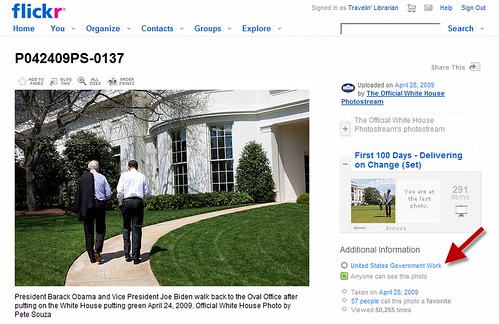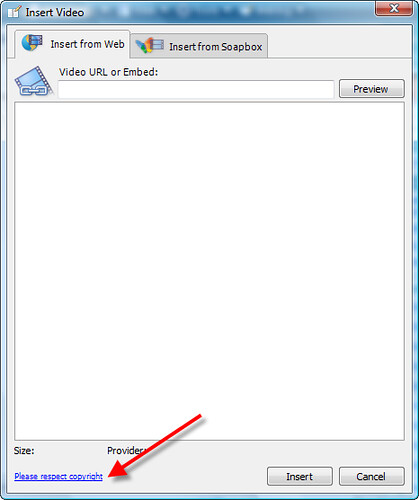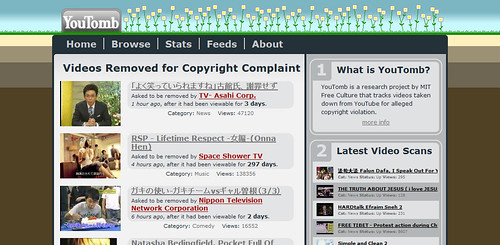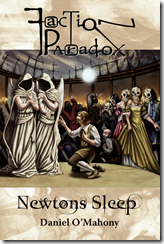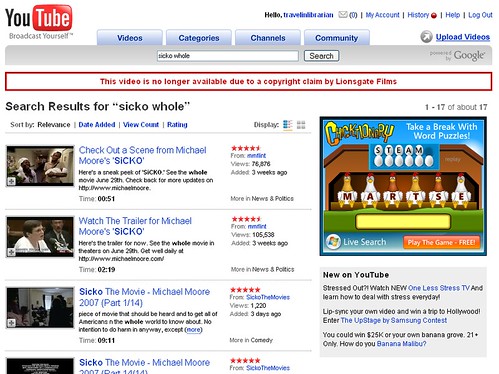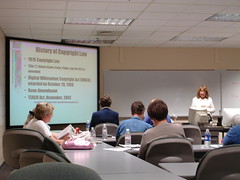I use Windows Live Writer to write most of my blog posts. (BTW, I love this program!) When I used the Insert Video function while writing my previous post on Obama I noticed a little link down at the bottom of the window labeled "Please respect copyright".
COPYRIGHT NOTICE & FAQ.
© 2007 Microsoft Corporation. All rights reserved.
The following is provided for informational purposes only and should not be construed as legal advice. If you need legal advice, contact a lawyer.
What is copyright?
Copyright law protects original works, such as websites, books, music, paintings, photos and video. A work is “original” if it contains some elements you created and did not borrow from others. Typically, when you create an original work, you own the copyright. As the copyright owner, you can control how others use your work. For example, if you write a movie script, you have the right to, and can prevent others from, copying your script, sharing it with others (“distributing it”), making a movie or book from your script (a “derivative work”), or publicly performing your script as a play or movie. You also have the ability to sell or give away these rights. In other words, you could sell the right to make a movie based on your script to a movie studio.
If you use someone else’s copyrighted materials without permission, that use generally violates the copyright owner's exclusive rights, and is copyright infringement. So if you create a new work and include parts of other people’s works in it (such as an existing photo, lengthy quotes from a book or a loop from a song), you must own or have permission to use the elements you borrow. For example, if your script is based on an existing popular series, you should obtain permission to use the elements you borrow from the series.
Copyright law is different from the law of personal property. If you buy a physical object, such as a movie on DVD, you own the physical object. You do not, however, obtain ownership of the “copyrights” (the rights to make copies, distribute, make derivatives and publicly perform or display) in the content of the movie. The fact that you have obtained physical possession of a DVD does not automatically grant you the right to copy or share it.
If you make your own movie, it may include many copyrighted works in it. So, if you decide to make a movie based on your script, you must either create all elements of it on your own, or have permission to use the elements you borrow. Especially keep in mind that photos or artwork hanging on the walls of your sets and music on the soundtrack (even if you own the CD or MP3) may be copyrighted. You should not include copyrighted works such as these in your movie without authorization.
A few other things to keep in mind are:
1.
Just because a work does not include a copyright notice (e.g., © 2006 Microsoft Corporation) does not mean the work is in the public domain. Copyright notices are generally not required for works to be protected by copyright.
2.
Just because a work is easily available on the internet or elsewhere does not mean you may use the work freely. Look for terms of use, such as Creative Commons, that explain how works you find on the Internet may be used.
Isn't it in the public domain?
Just because a work is freely available, does not mean it is in the “public domain.” Copyright is for a limited term; it does not last forever. In the copyright context, “public domain” means the copyright term has expired. Once a work is in the public domain, it may be freely used without permission from the copyright owner.
Determining the term of copyright can be complex, particularly because copyright laws vary from country to country. Also, even if the copyright on a work has expired, you should be careful about how you use a public domain work. For example, a book may be in the public domain, but it might not be ok to scan the book cover to cover and post it on the internet. This is because the particular version of the book may contain new copyrightable material that is not in the public domain, such as cover art or footnotes.
What about fair use?
In limited situations, you can use copyrighted works without permission from the copyright holder. It can be difficult to figure out whether use of copyrighted works without permission is legal, though, because the laws in this area are often vague and vary from country to country.
The copyright law in the United States has a doctrine called “fair use”. Fair use provides a defense to copyright infringement in some circumstances. For example, fair use allows documentary filmmakers to use very short clips of copyrighted movies, music and news footage without permission from the copyright owner. Fair use is a difficult concept because determining whether something is a fair use involves weighing four factors. Unfortunately, weighing the fair use factors rarely results in a clear-cut answer.
Rather than applying a fair use test, many other countries have specific exceptions to copyright infringement. The number and type of exceptions vary by country, but they frequently allow copyrighted materials to be used without permission from the copyright holder for activities such as nonprofit research, teaching, news reporting, or private study.
If you incorrectly decide that something is a fair use or falls into an exception to copyright infringement, you could be held criminally and civilly liable and have to pay damages. We suggest you talk to a lawyer if you have questions regarding fair uses of copyrighted works.
What happens if you upload copyrighted materials to one of our websites without permission?
By law, we are required to take down videos, music, photographs or other content you upload onto a website hosted by Microsoft if we learn that it infringes someone else’s copyright. If you believe that we have mistakenly taken down content you uploaded that you own or have permission to upload, you can also let us know that. Finally, if you upload infringing content repeatedly, we will terminate your account and you could face criminal and civil penalties. So please, respect other people’s copyrights.
What if my stuff is on a Microsoft website without my permission?
If you believe that anything on a website hosted by Microsoft infringes your copyright, let us know. Just provide us with the information requested here and we will see that your copyrighted works are taken down.
I want to share my content, but...
Many of our websites and services allow you to share content you create, such as video, music and photographs. Though there is no way for us to ensure that your content will not be misused when you share it online, you may consider making it available under a Creative Commons License.
Creative Commons licenses are a simple way for you to let people know what uses they can make of your creative works and under what conditions. Creative Commons licenses are customizable based on your preferences and are automatically generated through the use of an online form. The form includes questions such as whether your work may be used only for non-commercial purposes and whether the work may be modified. As such, a variety of licenses are possible. For example, an “attribution only” license allows others to make any use of your work as long as they indicate that you are the copyright holder.
Creative Commons is continually developing new licenses tailored to needs identified by creative people like you. To learn more about Creative Commons, or to prepare a Creative Commons license, visit their website (http://creativecommons.org/).
What if I don't want my website crawled?
Microsoft search services (MSN Search and Windows Live Search) follow the Robots Exclusion Standards. This means that you can control which pages Microsoft search engines index and how often Microsoft bots access your website. To learn how to do so, or for more information regarding Microsoft’s webcrawling and site indexing practices, please visit http://search.msn.com/docs/siteowner.aspx.
Over all I'd say that this is a reasonable document. Nothing here particularly made me cringe and that surprised me when reading a document from such a company as Microsoft. I will say though that I'm not exactly a fan of this advice: "We suggest you talk to a lawyer if you have questions regarding fair uses of copyrighted works." Why not at least attempt to explain how Fair Use works instead of pointing in the direction of a lawyer. (Yep, Microsoft's afraid of liability issues I'm sure.)
 Read this transcript of a recent talk by Cory Doctorow. Seriously, read this! Here are a few choice excerpts.
Read this transcript of a recent talk by Cory Doctorow. Seriously, read this! Here are a few choice excerpts.